Popular Nationalism and Zionism are pivotal movements in European history, arising in the 19th century. Popular Nationalism promoted the idea of national identity and sovereignty, leading to the unification of countries like Germany and Italy. Zionism, on the other hand, focused on establishing a Jewish homeland in response to European anti-Semitism, culminating in the creation of Israel. Both movements shaped modern political landscapes by advocating for self-determination and the cultural unity of distinct groups. These concepts are crucial in understanding AP European History, as they highlight the significant political and cultural shifts that defined the era.
Learning Objectives
Popular Nationalism and Zionism in the AP European History exam, you should understand the rise and impact of nationalism in 19th-century Europe, including how it unified and fragmented states. Study the origins and development of Zionism as a Jewish nationalist movement in response to European anti-Semitism and its goal of establishing a Jewish homeland. Analyze key figures, events, and ideologies that shaped both movements and assess their historical significance and long-term effects on European and global history.
Popular Nationalism
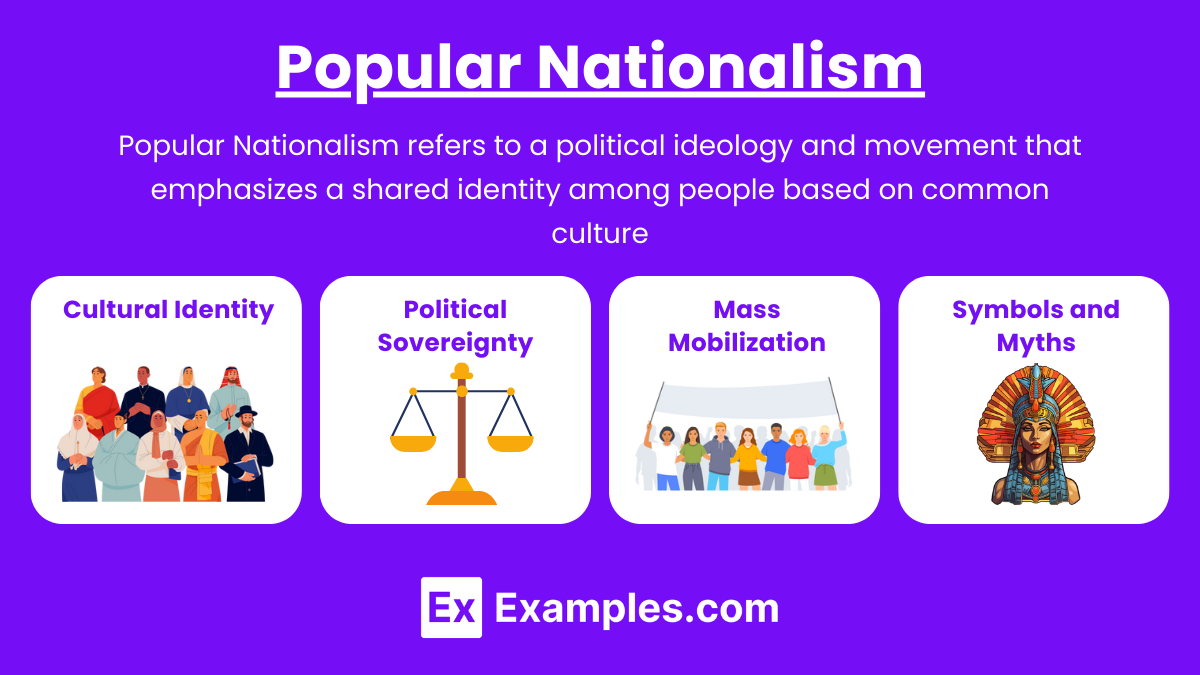
Popular Nationalism refers to a political ideology and movement that emphasizes a shared identity among people based on common culture, language, religion, or history. This identity fosters a sense of unity and a desire for self-governance. Popular nationalism became especially significant in Europe during the 19th century, influencing various political and social movements.
Key Features of Popular Nationalism
- Cultural Identity: The idea that a nation is defined by shared cultural elements like language, traditions, and customs.
- Political Sovereignty: A desire for self-rule and independence from foreign powers or rulers.
- Mass Mobilization: The involvement of the general population in nationalist movements, often leading to widespread social and political change.
- Symbols and Myths: The use of national symbols, myths, and historical events to create a sense of shared identity and purpose.
Historical Context and Development of Nationalism
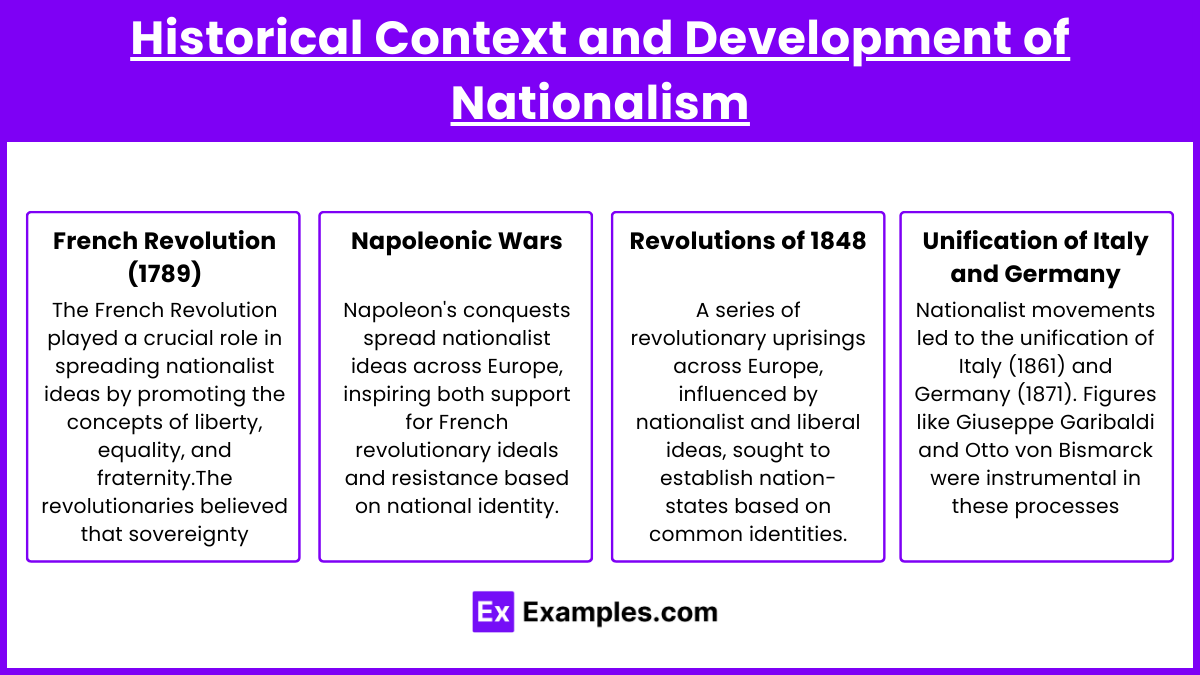
- French Revolution (1789): The French Revolution played a crucial role in spreading nationalist ideas by promoting the concepts of liberty, equality, and fraternity. The revolutionaries believed that sovereignty belonged to the people, not monarchs.
- Napoleonic Wars: Napoleon’s conquests spread nationalist ideas across Europe, inspiring both support for French revolutionary ideals and resistance based on national identity.
- Revolutions of 1848: A series of revolutionary uprisings across Europe, influenced by nationalist and liberal ideas, sought to establish nation-states based on common identities.
- Unification of Italy and Germany: Nationalist movements led to the unification of Italy (1861) and Germany (1871). Figures like Giuseppe Garibaldi and Otto von Bismarck were instrumental in these processes, using both diplomatic and military means to unite various states under a single national government.
Zionism
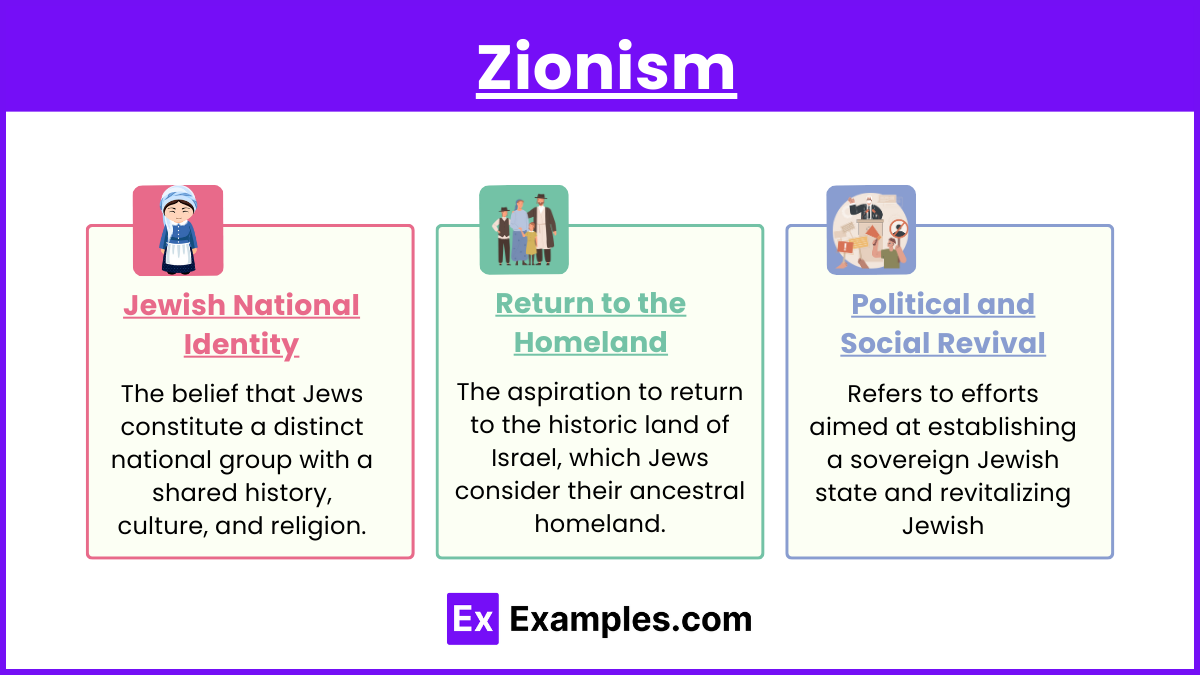
Zionism is a nationalist movement advocating for the establishment of a Jewish homeland in Palestine. It emerged in the late 19th century in response to widespread anti-Semitism and the desire for a national revival among Jews.
Key Elements of Zionism
- Jewish National Identity: The belief that Jews constitute a distinct national group with a shared history, culture, and religion.
- Return to the Homeland: The aspiration to return to the historic land of Israel, which Jews consider their ancestral homeland.
- Political and Social Revival: refers to efforts aimed at establishing a sovereign Jewish state and revitalizing Jewish cultural and social life.
Historical Development of Zionism
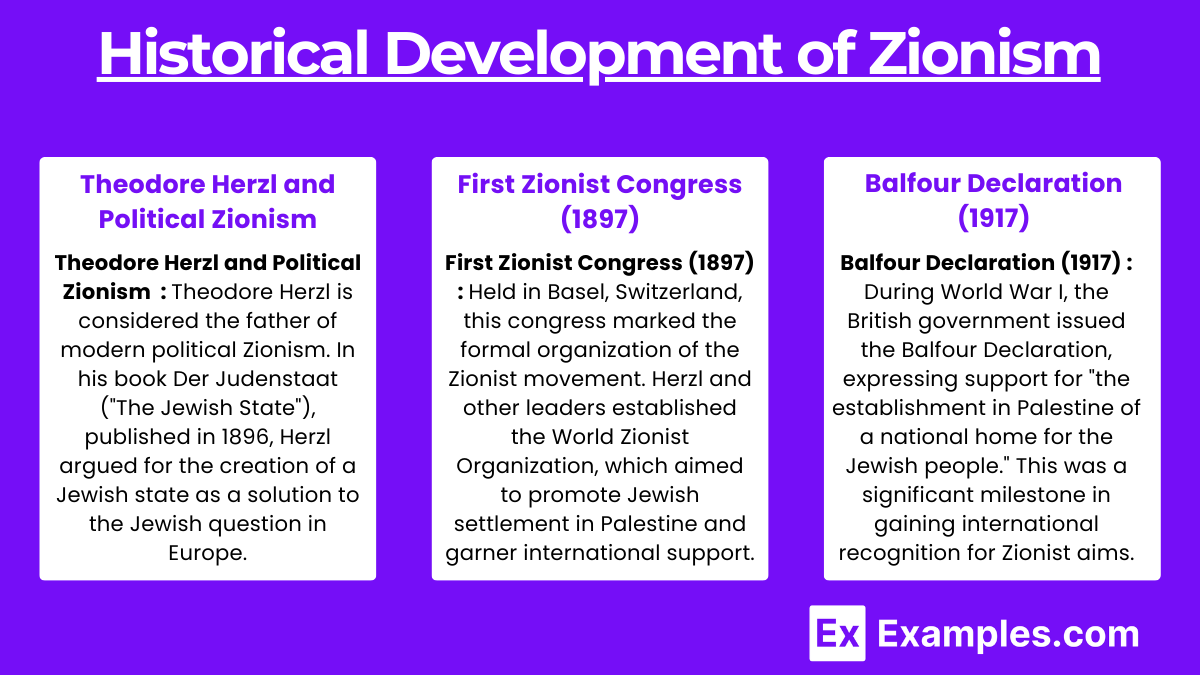
- Theodore Herzl and Political Zionism: Theodore Herzl is considered the father of modern political Zionism. In his book Der Judenstaat (“The Jewish State”), published in 1896, Herzl argued for the creation of a Jewish state as a solution to the Jewish question in Europe.
- First Zionist Congress (1897): Held in Basel, Switzerland, this congress marked the formal organization of the Zionist movement. Herzl and other leaders established the World Zionist Organization, which aimed to promote Jewish settlement in Palestine and garner international support.
- Balfour Declaration (1917): During World War I, the British government issued the Balfour Declaration, expressing support for “the establishment in Palestine of a national home for the Jewish people.” This was a significant milestone in gaining international recognition for Zionist aims.
Impact and Consequences
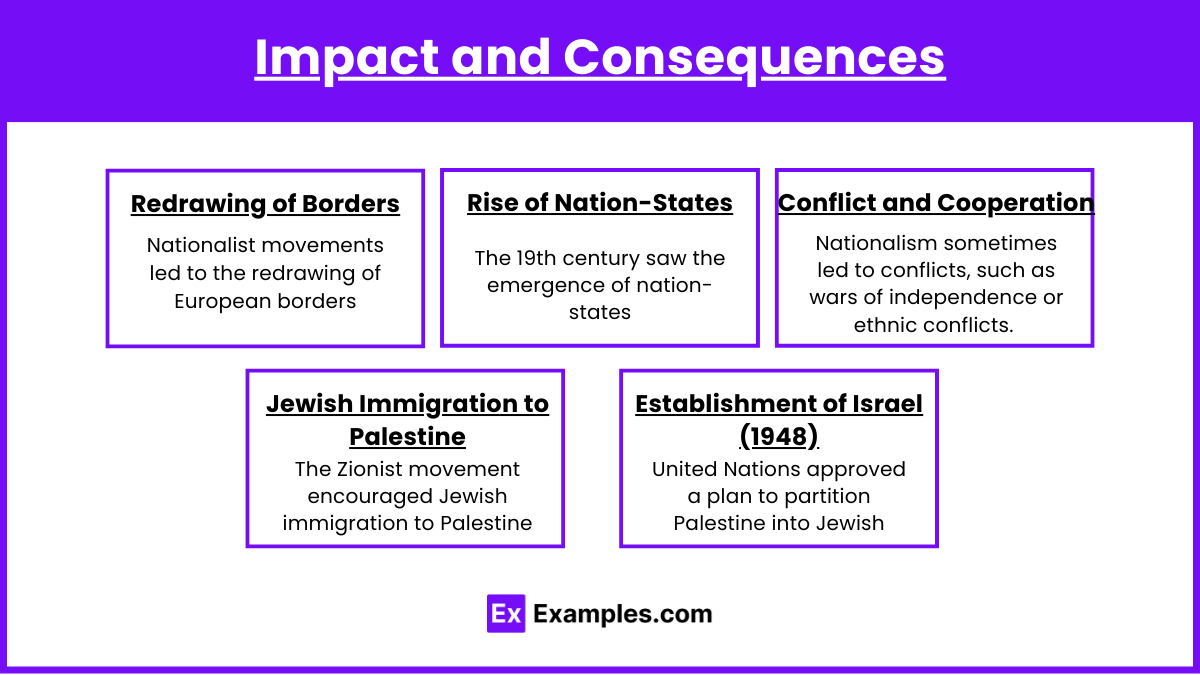
- Redrawing of Borders: Nationalist movements led to the redrawing of European borders, particularly after World War I, based on the principle of national self-determination.
- Rise of Nation-States: The 19th century saw the emergence of nation-states, where the political boundaries of a state coincide with the cultural boundaries of a nation.
- Conflict and Cooperation: Nationalism sometimes led to conflicts, such as wars of independence or ethnic conflicts. However, it also encouraged cooperation among people with shared identities and aspirations.
- Jewish Immigration to Palestine: The Zionist movement encouraged Jewish immigration to Palestine, leading to the establishment of Jewish communities and agricultural settlements.
- Establishment of Israel (1948): The United Nations approved a plan to partition Palestine into Jewish and Arab states, leading to the declaration of the State of Israel in 1948. This event was a culmination of Zionist aspirations but also sparked conflict with the Arab population and neighboring states.
Examples
Example 1
The Balfour Declaration (1917) : The Balfour Declaration was a statement by the British government expressing support for the establishment of a “national home for the Jewish people” in Palestine. It was a pivotal moment in Zionist history, as it was one of the first official endorsements by a major power of the Jewish aspiration for a homeland.
Example 2
The Jewish National Fund (JNF): Established in 1901, the Jewish National Fund was created to purchase and develop land in Palestine for Jewish settlement. The JNF played a significant role in the Zionist movement by promoting agricultural development and infrastructure in the region, fostering a sense of Jewish nationalism.
Example 3
Theodor Herzl and the First Zionist Congress (1897) : Theodor Herzl, often considered the father of modern political Zionism, convened the First Zionist Congress in Basel, Switzerland. The congress marked the formal organization of the Zionist movement and set forth the Basel Program, which aimed at establishing a legally secured homeland for Jews in Palestine.
Example 4
The Kibbutz Movement : The Kibbutz movement was a socialist experiment that became a vital part of the Zionist enterprise. It involved the creation of collective agricultural communities in Palestine, where members worked and lived together. The movement fostered a strong sense of community, shared responsibility, and dedication to building the Jewish homeland.
Example 5
The Aliyah Waves (Jewish Immigration to Palestine) : Several waves of Jewish immigration, known as Aliyah, significantly contributed to the establishment of the Jewish state. These migrations were driven by persecution, ideological commitment, and a desire for a safe haven. The influx of Jewish immigrants helped lay the demographic and cultural foundations for the future state of Israel.
MCQ’s
Question 1:
Which event is commonly associated with the emergence of Zionism as a political movement in the late 19th century?
A) The signing of the Balfour Declaration
B) The founding of the World Zionist Organization
C) The publication of Theodor Herzl’s “The Jewish State”
D) The establishment of the State of Israel
Answer: C) The publication of Theodor Herzl’s “The Jewish State”
Explanation: Theodor Herzl’s book, “The Jewish State,” published in 1896, is considered a foundational text in modern political Zionism. It called for the establishment of a Jewish homeland in response to widespread antisemitism in Europe. This publication helped galvanize support for Zionism as a political movement, leading to the first Zionist Congress in 1897 and the subsequent founding of the World Zionist Organization.
Question 2:
What is a key characteristic that distinguishes Popular Nationalism from other forms of nationalism?
A) Emphasis on a shared history and cultural heritage
B) Focus on economic independence
C) Advocacy for universal human rights
D) Promotion of a singular political leader
Answer: A) Emphasis on a shared history and cultural heritage
Explanation: Popular Nationalism is often characterized by a strong emphasis on shared history, language, and cultural heritage as the foundation of national identity. This form of nationalism seeks to unite people under a common cultural and historical narrative, fostering a sense of belonging and unity. It contrasts with civic nationalism, which focuses more on shared political and legal frameworks.
Question 3:
What was a major outcome of the Balfour Declaration in the context of Zionism?
A) It established the borders of the State of Israel.
B) It promised British support for a Jewish homeland in Palestine.
C) It led to the immediate mass migration of Jews to Palestine.
D) It guaranteed equal rights for Arabs and Jews in Palestine.
Answer: B) It promised British support for a Jewish homeland in Palestine.
Explanation: The Balfour Declaration, issued in 1917, was a statement by the British government expressing support for the establishment of a “national home for the Jewish people” in Palestine. While it did not immediately lead to mass migration or the establishment of state borders, it was a significant milestone in the Zionist movement, as it represented official recognition and support from a major world power. The declaration was later incorporated into the British Mandate for Palestine, setting the stage for further developments leading to the creation of the State of Israel in 1948.


